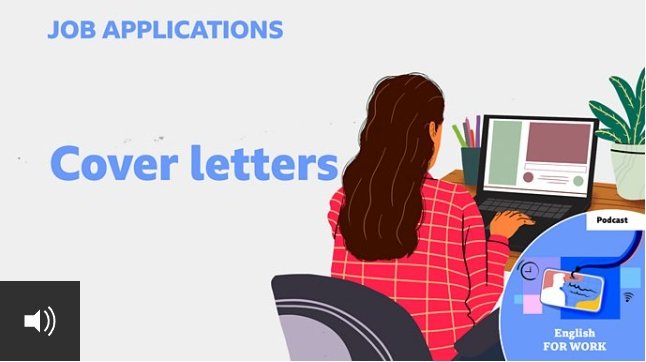Introduction
Once you’ve decided to apply for a job you need to write your application. In this episode, Pippa and Phil talk about how to use a cover letter to show off your personality.
Transcript
Note: This is a transcript of a spoken conversation and is not a word-for-word script.
Pippa
From BBC Learning English, this is Learning English for Work and welcome to our special series all about job applications. I’m Pippa.
Phil
And I’m Phil. In this series, we’re talking about applying for a new job in English and today, we’re talking about writing your application.
Pippa
Find a transcript of this episode to read along on our website: bbclearningenglish.com.
Phil
Right, so you’ve found a job you want to apply for, and your CV is ready, but now you have to write an application or a cover letter. What does this mean?
Pippa
So, a cover letter is a written application for the job, which you send alongside your CV, which we talked about in the first episode of this series. And a cover letter really just explains why you want the job and why you would be good at the job.
Phil
Yeah, it allows you to give a bit more detail about your experience. And you might find that not all employers ask for a cover letter, but there’s often a section of the application where you have to write about yourself and why you’d be good for the job.
Pippa
Yeah, and we do call it a cover letter. But these days it would usually be an email. So you don’t have to physically mail a letter unless they ask for that.
So, let’s hear a bit more about how to approach cover letters from our application expert, Amy Evans.
Phil
Amy works in recruitment for the BBC World Service, and she says that a cover letter is a place to show off your personality.
Amy Evans
In a cover letter you want to show a bit of your sort of personality and who you are as a person, but I would say as a general rule of thumb, keep the language formal.
Pippa
People can find writing cover letters, difficult, but Amy says it’s really important to adapt your cover letter for each job that you apply for.
Amy Evans
Quite often you can come across somebody that has clearly sort of has one cover letter. So it doesn’t quite make sense in the context of the job they’re applying for. But I think if you’re really passionate about applying for the job, make sure you… you really tailor the cover letter for that specific job and why you want to apply for that company in that role and why you think you have the skills and experience to do the job.
Phil
In the last episode, we heard all about job descriptions and how useful they can be throughout the application. So, should we use the job description when we write a cover letter?
Pippa
Yeah, absolutely. We should. But be careful because you don’t just want to repeat everything that the job description is asking for.
Amy Evans
Try and avoid literally copying and pasting the exact wording from the job description and just saying I can do this. But certainly, I would say, take the points that they’re asking about and use that to format your answers and give sort of… you can then use your specific experience to show how you cover them off.
Phil
Amy says you need to show how you cover off the criteria in the job descriptions. This means writing about things you’ve done that show you can meet the job description.
Pippa
Yeah, and whilst writing a cover letter in English might be a stressful thing to do, Amy says that you do need to think about your language and grammar quite carefully.
Amy Evans
Try and avoid spelling mistakes and grammar mistakes just because it can show a lack of attention to detail which people then sort of think, well, if they’ve not put detail into the application then what will they be, you know, into the job.
Pippa
So, it’s interesting to think about a cover letter as a place for more of your personality. So, the CV that you write is just the facts and then the cover letter is space for you to talk more about yourself.
Phil
OK yeah, so as you said, you’ve got your CV, which is quite formal, and you don’t want to repeat that with your cover letter. So, a good way to avoid doing that is to think about specific examples of things that you’ve done in your previous job and then you can say things like I’ve excelled in… something that you were very good at. Or I was responsible for… something important that you were good at doing or I learned how to… to show that you can develop. Things like that can give it a bit more personality.
Pippa
And people always worry about how to address the letter. So, you need to do this formally so try to find out who the hiring manager is and address it personally to them. So you can ring up or email to ask and then send it formally, so ‘dear so-and-so’.
Phil
Of course, yeah, we heard that spelling and grammar and all of those things are really important. So, we’ve got a grammar podcast that you can find that will help you with your grammar. What’s it called, Pippa?
Pippa
It’s called Learning English Grammar and you can find that on your podcast app or on our website.
That’s it for this episode.
Phil
Next time, we’ll talk about preparing for and practising for an interview.
Pippa
See you, then. Bye.
Phil
Bye.
